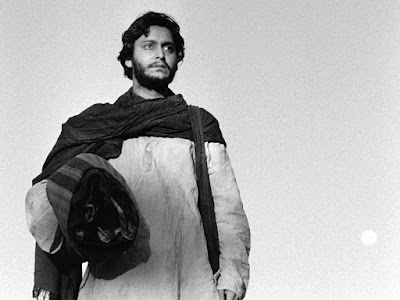1. B. Voice Narrator
Amitabh Bachchan made his film debut
in 1969, as a voice narrator in Mrinal Sen's National Award-winning film “Bhuvan
Shome”. His first acting role was as one of the seven protagonists in the film “Saat
Hindustani”, directed by Khwaja Ahmad Abbas and featuring Utpal Dutt, Anwar Ali,
Madhu and Jalal Agha.
“Bhuvan Shome” is a 1969 film
directed by Mrinal Sen (Sen’s first film in Hindi) based on a Bengali story by
Balai Chand Mukhopadhyay. The cast included Utpal Dutt (Mr. Bhuvan Shome) and
Suhasini Mulay (Gauri, a village girl) in her debut film. The film is
considered a landmark in modern Indian cinema as it heralded a New Wave of
Cinema in India. It was one of the earliest films to get funded by the “National
Film Development Corporation of India” (NFDC). “Bhuvan Shome” bagged three
major Awards at the National Film Awards in 1969 - Best Feature Film, Best
Director - Mrinal Sen and Best Actor - Utpal Dutt.
(Amitabh Bachchan in ”Saat Hindustani”, extreme
right)
“Saat Hindustani”, a 1969 Indian
film, written and directed by Khwaja Ahmad Abbas, portrays the heroic story of
seven Indians who attempt to liberate Goa from the Portuguese colonial rule.
The film won two National Film Awards - Nargis Dutt Award for Best Feature Film
on National Integration and National Film Award for Best Lyrics to Kaifi Azmi.
2. C. Adoor Gopalakrishnan
Adoor Gopalakrishnan (born - 3 July
1941) is an Indian film director, script writer and producer. and is regarded
as one of the most notable filmmakers in India. With the release of his first
feature film Swayamvaram (1972), Adoor pioneered the new wave in Malayalam
cinema during the 1970s. In a career spanning over five decades, Adoor has made
only 12 feature films to date. His films are made in the Malayalam language and
often depict the society and culture of his native state Kerala. Nearly all of
his films premiered at Venice, Cannes and Toronto International Film Festival.
Along with Satyajit Ray and Mrinal Sen, Adoor is one of the most recognized
Indian film directors in world cinema.
(A still from “Elippathayam
– 1981”)
For his films, Adoor has won the
National Film Award 16 times, next only to Ray and Sen. He was awarded Padma
Shri in 1984 and the Padma Vibhushan in 2006. He received the Dadasaheb Phalke
Award in 2004 for his valuable contributions to Indian cinema.
(A still from “Anantaram
- 1987”)
Some of his notable films are Swayamvaram
(1972) - National Awards for Best Film, Best Director, Best Actress (Sharada)
and Best Cinematographer, Elippathayam (1981) - National Awards for Best
Feature Film in Malayalam, Mukhamukham (1984) - National Awards for Best Director
and Best Screenplay, Anantaram (1987) - National Awards for Best Director and Best
Screenplay, Mathilukal (1990) - National Awards for Best Director and Best
Actor (Mammootty), Vidheyan (1993) - National Awards for Best Director and Best
Actor (Mammootty).
3. A. Byari
“Byari” is a 2011 Indian film in
Beary (Byari) language written and directed by Suveeran. It is the first
feature film to be made in this language. Byari won the National Film Award for
“Best Feature Film” while Malayalam actress Mallika got a special mention from
the National Film Award jury for her performance in the film.
Byari is a community concentrated
mostly along the southwest coast of India, in Coastal Dakshina Kannada (a
District in Karnataka) and some parts of North Kerala who speak “Byari”, a
language made of Malayalam idioms with Tulu phonology and grammar. It is an
ethnic Muslim society, having
its own unique Traditions and distinct cultural identity. Byaris also
incorporate the local Tulu culture and diverse traditions of the Moplahs of the
Malabar Coast.
4. B. Virasat
“Virasat”, one of the
highest-grossing Bollywood films of 1997, was a remake of the Tamil film “Thevar
Magan”. Virasat was directed by Priyadarshan with the original story by Kamal
Haasan, produced by Mushir-Riaz starring Anil Kapoor, Tabu, Amrish Puri, Pooja
Batra, Milind Gunaji and Govind Namdeo.
“Thevar Magan” (Son of Thevar) is a 1992 Indian Tamil film directed by Bharathan
starring Sivaji Ganesan, Kamal Haasan, Revathi, Gautami, Nassar, Kaka
Radhakrishnan, and Vadivelu. The film's soundtrack album and background score were composed by Ilaiyaraaja. The film's
script was written by Kamal Haasan, who also produced the film along with his
brother Chandrahasan under Raaj Kamal Films International. The film, inspired
by the Hollywood classic “The Godfather” (directed by Francis Ford Coppola),
was chosen as India’s Official entry for the Best Foreign Language Film for the
65th Academy Awards.
5. C. Apur Sansar
“Apur
Sansar” is a 1959 Bengali film written and directed by Satyajit Ray, widely
regarded as one of the greatest filmmakers of all time. It is the third part of
The Apu Trilogy, about the childhood and early adulthood of a young Bengali
named “Apu” in the early twentieth century India. The film is based on the last
two-thirds of the 1932 Bengali novel, “Aparajito”, by Bibhutibhushan
Bandopadhyay. Released in 1959, “Apur Sansar” focuses on Apu's adult life and introduces
the actors “Soumitra Chatterjee” and “Sharmila Tagore”, who would go on to
appear in many subsequent Ray films. The film won the National Film Award for
Best Feature Film and several international awards, including the “Sutherland
Award for Best Original and Imaginative Film”. The film has been influential
across the world and is frequently listed among the greatest films of all time.
(Satyajit
Ray behind the lens)
(The Apu Trilogy)
The Apu
Trilogy, [Consisting of Pather Panchali (1955), Aparajito (1956) and Apur Sansar (1959)] directed by Satyajit Ray, is based on two Bengali novels
written by Bibhutibhushan Bandopadhyay: Pather Panchali (1929) and Aparajito
(1932). Produced on shoestring budget using an amateur cast and crew, the Triology
went on to win many national and international awards, including three National
Film Awards and seven awards from the Cannes, Berlin and Venice Film Festivals
and has remained a milestone in Indian cinema.
























No comments:
Post a Comment